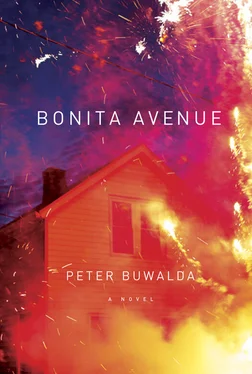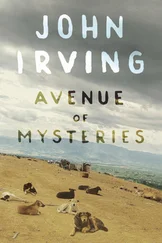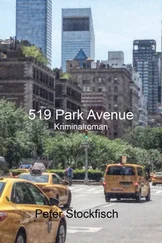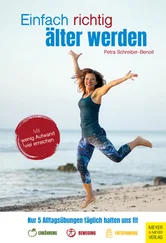Unease creeps over him, his wife’s voice has sobered him up, the intimacy of her message, but most of all her voice: the familiarity, the soothing tone, and at the same time her ignorance of his woes: everything underscores the insanity of the evening, his inane drivel in the darkness, the crack of Wilbert’s elbow. Tineke’s voice versus that crack.
He takes two steps to the liquor cabinet, glass crackling under the soles of his shoes, a bottle of Baileys, he squats down next to it with his back against the ice-cold stuccoed wall, listening, waiting. He runs his index finger through the brownish liquid and licks it off.
How long does he sit there? An hour? He’s not sure, his legs are asleep, the balls of his feet have gone numb. He stays sitting there until he’s stopped believing. The kid is gone. In the emergency room by now, even patched up already. He is alone in this house.
He gets up and walks to the sunroom, gropes for the switch to the table lamp, an explosion of light: nothing. He sits down at the table, panting from the strain. On the glass roof is something darker than night: snow, of course. He sees his reflection in the picture window. Immediately he gets back up and dims this display case he’s standing in. Snowflakes stick to the glass. How dangerous is a man with one arm, with one hand? Harmless, even with saws or hammers. He walks stiffly, but with the same aplomb, into the kitchen: no one. The under-cabinet lighting is on, a box of paracetamol is lying on the counter, next to it a blister strip from which four tablets have been punched out. He feels his chafed chin, dabs the bleeding wound with a piece of paper towel. He takes three tablets.
The phone is lying in the sink— in it, strangely enough — and next to it a liquor bottle. Rum. It was part of last spring’s anniversary gift basket, a liter of “Lust Rum,” bottled especially for Tubantia, it’s cheap rotgut. He picks up the bottle and sees that it is threequarters empty. It was unopened before tonight, he’s certain of it. There is, he notices in a flash, a knife missing from the wooden block next to the microwave. He swerves around, looks around. Relax. That knife is safely stowed in the dishwasher. He’s gone. Still, he pulls a stubby steak knife out of the block. He walks over to the cellar stairs, turns around, goes back to the counter. Everything hurts. He takes a swig of rum, it’s poison, and walks back to the hole in the floor. The stairs creak, he’s hardly been down here these past few months; from the dust on the cement floor he sees that no one else has either. Still he checks behind all the racks.
Finally he stumbles into the utility room, it’s cold as anything in there, little puffs of condensation glide out of his mouth. The door to the terrace is ajar, one of the windowpanes has been smashed. So that’s how he got in. He pulls the door shut, turns the key, and removes it. He fastens the deadbolts.
And now? He is exhausted but sleep is out of the question. He could power his car all the way to France on adrenaline alone. The thought of drawing the curtains, turning down the heat, and crawling into bed is ludicrous. He has read enough insipid thrillers, seen enough Hollywood movies, to know that this house is the last place on earth he can afford to be unconscious. Pajamas on, teeth brushed, and lie there waiting for the plot to unfold. A fire, ignited with gasoline from Tineke’s workshop. An ice-cold gun barrel in his neck as he starts his car tomorrow morning. An axe — he’ll wake with a start in the middle of the night, a finger tapping his forehead, tick, tick, wake up pal, upon which his skull is cleaved with the same axe Tineke uses to chop wood every autumn.
He must clean the place up. Figuring it out takes some time, but finally the drawers of the buffet roll willingly into place. He stacks the envelopes, sweeps the confetti into a dustpan, scoops the pens and pencils up off the floor. With each movement his ribs swap places. He plucks shards of glass out of the puddle of Baileys, mops the floor with a wet dishtowel. He doesn’t dare vacuum, he has to be able to hear . In the utility room he tears off a piece of corrugated cardboard from a wine box and, shivering from the cold, tapes it over the broken windowpane.
He has decided to set off tonight; that is, as soon as possible. As he expunges all traces of that grotesque scuffle — he scrubs away the blood stains in the front hall and living room with all-purpose cleaner, hangs Tineke’s dresses meticulously back in place, arranges the shoes on the rack, wipes the blood from the edges with a wet rag — he becomes calmer, and muses on the plotlessness of this evening. An unfinished tragedy took place, a tragedy without a glimmer of a catharsis, nothing was resolved, the bleakness has only deepened. And now? Now he is expected to join his family at Hans and Ria’s, they will greet one another, and then? Christmas will come, he will either confide in Tineke or not, and then? In the new year he will return to The Hague, and when his staff ask how his holiday was, he will answer: invigorating.
Aaron had taken the early-morning train to Brussels and stepped into a travel agency on the way to his appointment with the psychiatrist. Seated at the round multiplex table, the travel agent stuffed him like a Toulouse goose full of brochures about California: scenic drives down Highway 1, mustsee national parks, Death Valley, and much more. Only after the girl had finished her spiel did he mention his specific interest in Los Angeles.
Nothing had been booked yet, he was still just exploring possibilities. His plan was to spend part of the summer in Santa Monica, perhaps take an apartment on the beach or, if need be, a hotel; he’d enroll in a photography workshop — that was how he tried to sell it to Herreweghe later that morning. But he didn’t buy it. Herreweghe — the psychiatrist he’d been seeing for about eight years, on a referral from Elisabeth Haitink — was not the observant type, but rather the correctional: a doctor-as-curator. The humorless, businesslike Herreweghe managed your psyche.
The padded treatment room struck him as typically Belgian, furnished as though Jung or Reich were standing in an adjacent room mixing opiates; heavy, immovable furniture, authoritarian elmwood bookcases, the leather-bound medical journals behind the glass reminding you that you knew nothing about your own piddling ego. “You haven’t set foot outside Belgium for years,” Herreweghe said.
“Venlo,” Aaron replied.
“Venlo. And now Los Angeles.”
He wasn’t quite being straight, which said something about the nature of his plans. He told Herreweghe about a friend who had emigrated to America, how inspired he was by what she wrote about her new home, her enthusiasm rekindled a lifelong desire to visit America, and more such drivel, and it almost looked like he’d get away with it, they were already talking about a medical passport and emergency numbers. It was none of this guy’s business that he wanted to go to Santa Monica to see Joni. He knew that Professor Herreweghe worked for a government stalker-rehab clinic — obsessivos delivered to him by the Ministry of Justice — so he was wary of the s-word, ungrounded of course, but probably hard to avoid.
“What’s her name, your American friend?”
He tried to come up with a fake name. Unfortunately, with this man a single twitch could trigger his snare.
“Is it Joni?”
“I have no plans to look her up.” He felt himself blush. And yet in a sense he was telling the truth: an arranged meeting with Joni was out of the question, she was keeping a polite distance, not even that, she was actively avoiding the issue, and maybe an official visit was too much of a good thing, he thought, too emotionally charged. So he would go to Los Angeles on his own, stay there awhile, have a vacation, what was wrong with that? And from that relaxed situation he might try to make contact with her.
Читать дальше












